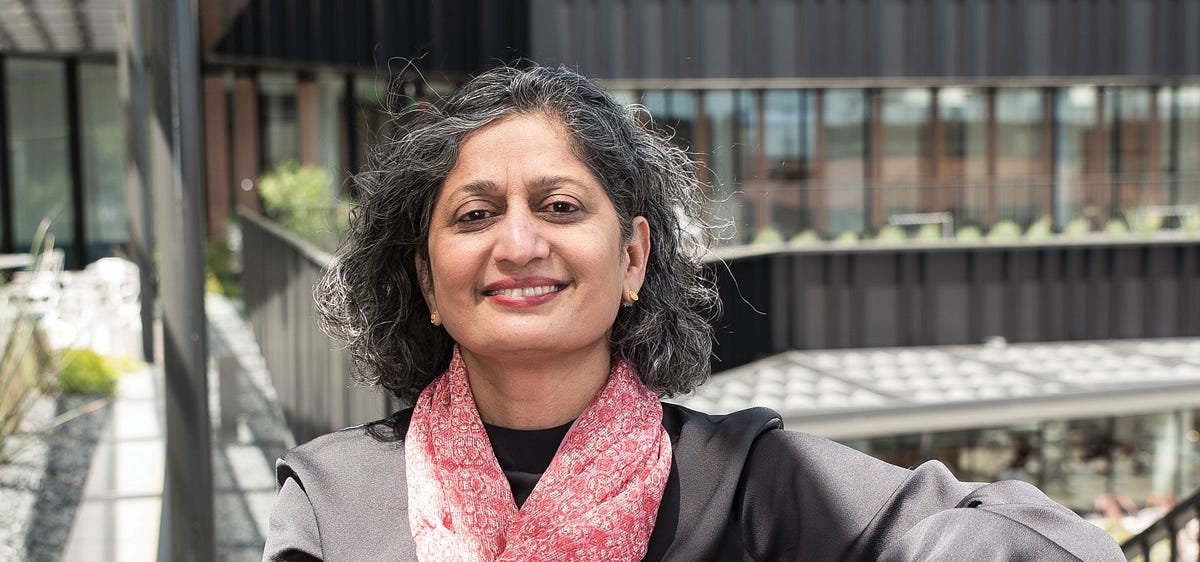Bringing Everyone into the Conversation
An interview with Raji Srinivasan, McCombs’ first associate dean for Diversity and Inclusion

This summer, Dean Jay Hartzell created a new leadership role at Texas McCombs to better nurture a culture of diversity and inclusion within the community of students, faculty, and staff. The mandate for this new position of associate dean for Diversity and Inclusion is to create a community within the business school that reflects the diversity of the state of Texas it serves, as well as the national and international community that seeks it out. After an exhaustive search, Marketing Professor Raji Srinivasan, a popular teacher and a respected scholar, was appointed to serve in this role and began her work on July 1.
“Raji has been an outspoken advocate for the rights of many underrepresented groups around campus, and she will guide our diversity and inclusion efforts with the focus and resolve that they deserve,” Hartzell says.
We talked with her about the job, her goals, and the challenges ahead.
Q: Why did you accept the appointment, and why do you think you are uniquely qualified to play a leadership role in this area?
A: I joined Texas McCombs as an assistant professor in 2000 and have spent the last 18 years as a research professor, moving through the ranks of assistant professor, associate professor, and full professor. This institution has been wonderful to me, enabling me to pursue my professional research and teaching career goals. So, when Dean Hartzell asked me if I would be willing to take on this new — and what I considered to be an important — responsibility, I was delighted to be able to give back to the institution that has given so much to me.
I think I bring some unique skills to this position. I am a South Asian woman who came to the United States as a graduate student with two young children. It would be fair to say that as an immigrant student, I had a range of experiences, some negative, but most largely positive, that have allowed me to both appreciate and celebrate different perspectives.
In addition, I grew up in a family where two of my immediate family members suffered from a debilitating mental disability, which provided me a deep appreciation of being differently abled, and has allowed me to understand the importance of inclusion for all members of the community. I think having close family members who were excluded from many social events in public spaces has made me very receptive to the idea of including everyone in conversations.
Q: Whose interests do you serve in this role?
A: I believe I serve the interests of multiple constituencies, including students, faculty, staff, alumni, the dean, and The University of Texas at Austin. In addition, I believe that working at a leading business school in the state of Texas, I also serve the interests of the local community in Texas, and in Austin, in particular.
Q: How do you see McCombs’ diversity and inclusion initiatives fitting into the McCombs Strategic Plan?
A: Dean Hartzell’s strategic plan for Texas McCombs builds on the theme of Human Centered, Future Focused. Today’s corporations are increasingly serving complex, diverse markets all around the world. Consider that of the more than seven billion people in the world, only 325 million or so live in the United States. Large companies look to grow in the diverse markets outside this country. They seek employees, customers, and business partners in a multicultural, global marketplace.
Given this background, a key skill for senior leadership to manage these complex markets is global acumen, the skill to effectively manage within a diverse, multicultural world, whether by serving customers in these markets or seeking to hire from a diverse, multicultural talent pool. I believe that as a premier business school preparing the leaders of the future, McCombs has an obligation to help them develop the global acumen to manage in a complex and diverse world, including customers, channel partners, and employees.
Q: Since accepting this role, what have you learned about the culture of inclusion at Texas McCombs?
A: We already have a strong culture of inclusion across the different programs — BBA, MBA, MPA, MS, and Ph.D. We have committed and dedicated colleagues in the various program offices who work with our students, staff, and faculty colleagues to enhance the culture of inclusion for our community.
Q: What are your goals?
A: My goal is to create a community whose diversity profile reflects the community at large that we serve both in the state of Texas and nationally. In addition, we want to create a culture of inclusion so that all our community members can bring their full selves to work, to be more effective, fulfilled, and happy.
Q: What have you accomplished so far?
A: Since I started this summer, we have undertaken diversity-based workshops for staff, faculty, and students. We have set up a McCombs Diversity and Inclusion web page, which serves as a resource for prospective, incoming, and current students, staff, and faculty — and an intranet page for faculty and staff, which includes resources on D&I-related issues for recruiting, teaching, and leading in the McCombs community. So far, we have received an excellent reception.
Q: Our students are bright and intuitive. How are they helping you understand where progress needs to be made?
A: Yes, McCombs students are among the brightest and the best. They are also committed to our mission of diversity and inclusion in the McCombs community. Whether BBA, MBA, MPA, MS, or Ph.D., they have very cogently articulated their demanding needs for this. Indeed, they have identified specific areas, including the classroom environment, where they feel that McCombs can make substantive progress in the coming years. And I agree that we can do better and we will, in the coming months and years.
Q: What have you learned that you believe applies to workplaces where many of our alumni are working as well?
A: A key skill for senior leadership to manage these complex, multicultural, global markets is global acumen, the skill to manage in a diverse, multicultural world. This is a skill that all our alumni need in order to lead organizations with the future in mind.
This article appeared in the fall 2018 issue of McCombs magazine. Click on the link to see the full issue.
About this Post
Share:


